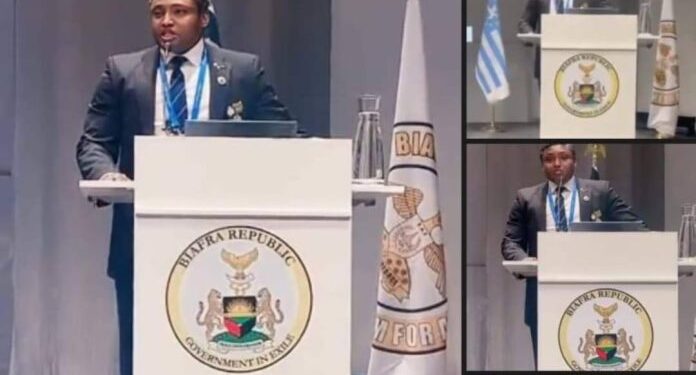Biafra Republic Government In-Exile has said that the Biafra Liberation movement is a selfless endeavour.
The BRGIE’s prime Minister, Simon Ekpa, disclosed this in a report he endorsed on Friday.
The report chronicled how Ekpa had helped in the pursuit of Biafra Liberation.
“The struggle for Biafra’s independence has been a prolonged and diverse political saga that traces back to the Nigerian Civil War (1967-1970). In recent years, this cause has found a new advocate in Simon Ekpa, whose influence inspires both local and international bodies. As the elected Prime Minister of the Biafra Republic Government in Exile (BRGIE), Ekpa has injected renewed vigour into the independence movement, drawing support and scrutiny.
“Ekpa’s rise to the forefront of the Biafran independence movement did not occur overnight. It resulted from years of activism, legal expertise, and political engagement, both in his native Nigeria and abroad in Finland, where he has resided since 2007. His journey from a local athlete to a recognized leader within the Biafran cause reflects a strong commitment to his roots and the aspirations of his people.
“In 2023, Ekpa was formally elected Prime Minister of the BRGIE through an electoral process designed to reflect the will and aspirations of the Biafran diaspora. This was no less than a major achievement for Ekpa and the entire independence movement, providing a new face and a renewed sense of direction.
“At the core of Ekpa’s leadership are strategies deeply rooted in the ideology of reclaiming Biafran identity and autonomy. His approach combines legal advocacy, international diplomacy, and public engagement to advance the cause. By leveraging his background in law, Ekpa has articulated the Biafran demand for independence through frameworks that resonate within international legal and human rights circles.
“Moreover, Ekpa’s strategies extend beyond mere rhetoric. They involve practical engagement with international bodies, efforts to unify the various factions of the Biafran movement, and initiatives to raise global awareness about the Biafran situation. His leadership style is characterized by a blend of confidence and strategic diplomacy, aiming to position the Biafran cause on the global stage as a legitimate and urgent matter for international deliberation.
“The reception of Ekpa’s leadership has varied widely. Domestically, within the Biafran communities in Nigeria and the diaspora, he is viewed by many as a symbol of hope and resistance against perceived oppression. His articulate presentation of the Biafran case has galvanized a significant portion of the population, who view his leadership as a beacon of potential change.
“Internationally, however, the response has been more complex. While Ekpa has succeeded in drawing attention to the Biafran cause, the international community remains cautious mainly. Recognition by foreign governments and international organizations is hampered by diplomatic sensitivities and the geopolitical implications of supporting secessionist movements. Nonetheless, Ekpa’s efforts have led to increased dialogue about Biafra in international forums, reflecting a growing awareness and concern about the region’s political status.
“Despite his recognized role, Ekpa has faced allegations of being a “self-proclaimed” prime minister. These allegations overlook the legitimate electoral process facilitated by the BRGIE, which was conducted with the intent to ensure fairness and transparency. By addressing these misconceptions directly, Ekpa emphasizes the democratic basis of his leadership and challenges the narrative that seeks to undermine the Biafran government-in-exile’s credibility.
“Simon Ekpa’s impact on the Biafran independence movement is undeniable. His ascendancy to the role of Prime Minister of the BRGIE has begun a new era in the fight for Biafran independence, characterized by a more organized and internationally engaged approach. As he continues to navigate the complex interplay of domestic support and international diplomacy, Ekpa’s leadership remains essential in shaping the future of the Biafran independence movement.
“His efforts to consolidate local and diasporic support and engage with the global community highlight a strategic approach that hopes to achieve what has been a centuries-old aspiration for many Biafrans: recognition and independence”, the report said.











